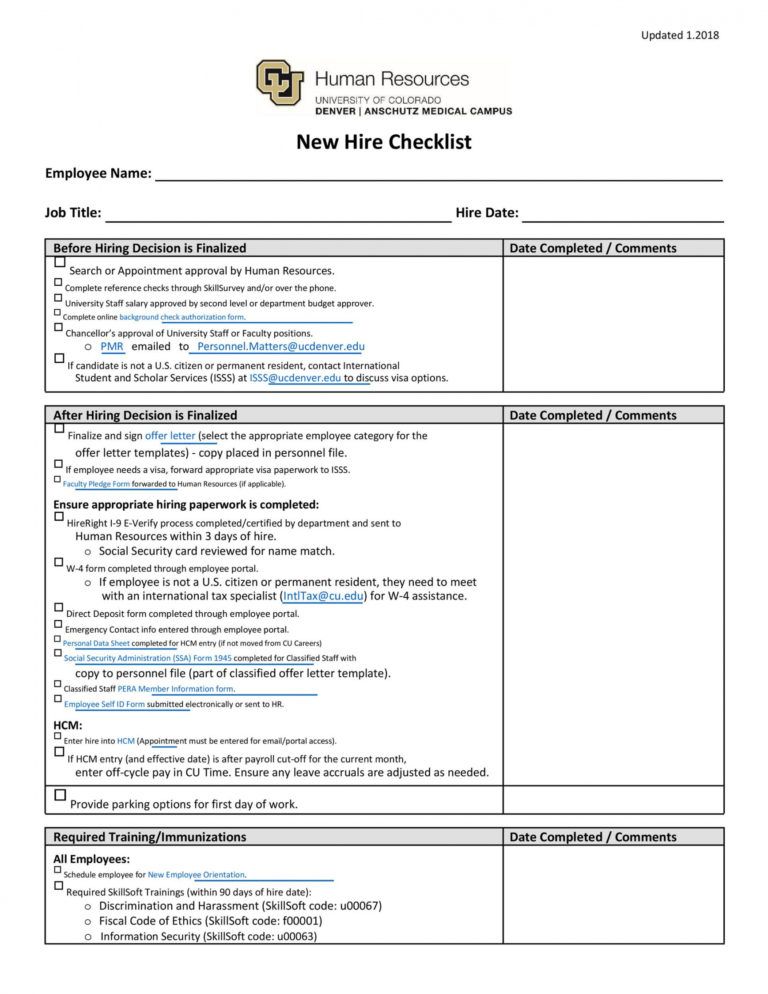6 Essential Documents New Employees Must Complete

In the journey of welcoming a new employee, the initial stages often involve a whirlwind of paperwork that can seem overwhelming. However, understanding and completing these documents promptly is crucial for ensuring a smooth transition into the workforce. Whether you're an HR professional, a new hire, or an employer, knowing what essential documents need to be completed can help streamline the onboarding process. Here's a detailed guide on the six key documents every new employee should handle upon joining a company.
1. Employment Contract

An employment contract is the backbone of the employee-employer relationship. This legal document outlines:
- The job title and duties of the employee.
- Terms of employment, including work hours, probation period, and termination conditions.
- Compensation details like salary, bonuses, benefits, and overtime rates.
- Non-compete clauses, confidentiality agreements, and other legal considerations.
Note: Employees should carefully review this document before signing. It’s not just about formalizing the hiring process; it protects both the employee and the employer by setting clear expectations.
2. W-4 Form

In the United States, the W-4 form, or Employee’s Withholding Certificate, is essential for:
- Determining how much federal income tax to withhold from each paycheck.
- Providing personal information for tax identification purposes.
- Allowing adjustments for additional income or income from a spouse, if applicable.
Completing this form accurately helps prevent overpaying or underpaying taxes throughout the year.
3. I-9 Form

The I-9 form verifies an employee’s identity and employment authorization. It requires:
- Providing identification documents (passport, driver’s license, etc.).
- Proof of eligibility to work in the U.S.
- Employer’s obligation to review these documents and retain copies.
This form is critical to comply with U.S. employment eligibility verification laws, preventing unauthorized employment.
🔍 Note: Employers must retain Form I-9 for a specific period after an employee’s employment ends.
4. Direct Deposit Authorization

With digital payroll being the norm, employees are often required to:
- Provide bank account details for salary disbursement.
- Authorize the employer to make direct deposits into the account.
This method is secure, efficient, and reduces the risk of lost or stolen checks.
5. Health Insurance Enrollment Forms

Health insurance benefits are a significant part of compensation packages. New employees need to:
- Choose between the offered health plans or opt-out.
- Decide on coverage for dependents.
- Understand premiums, deductibles, and co-payments.
These forms help ensure employees have the health coverage they need, often at a reduced cost through employer-sponsored plans.
6. Employee Handbook Acknowledgment

An employee handbook provides an overview of company policies. Acknowledgment forms require employees to:
- Confirm they’ve read and understood the handbook.
- Agree to abide by the company’s policies, including harassment prevention, leave policies, and code of conduct.
This acknowledgment helps establish a mutual understanding of workplace rules and employee rights.
To summarize, the onboarding process involves a careful handling of several crucial documents that help establish the foundational elements of an employment relationship. From the legal binding of an employment contract to the administrative accuracy of tax forms, each document serves a distinct purpose in ensuring a well-documented, compliant, and transparent hiring process.
What should I do if I lose my employment contract?

+
If you lose your employment contract, contact your HR department. They will typically have a copy on file and can provide you with another one.
How does changing my W-4 form affect my take-home pay?

+
Adjusting your W-4 form can increase or decrease your tax withholdings, directly impacting your take-home pay. More allowances generally lead to less tax being withheld each pay period, hence more take-home pay, but possibly more owed during tax filing time.
Is it necessary to fill out an I-9 form if I’m not a U.S. citizen?

+
Yes, the I-9 form is required for all employees hired to work in the U.S., regardless of citizenship status, to verify employment authorization.
What if I don’t have health insurance from my employer?

+
If your employer does not offer health insurance or if you choose not to enroll, you can look into the Health Insurance Marketplace or seek private insurance options.